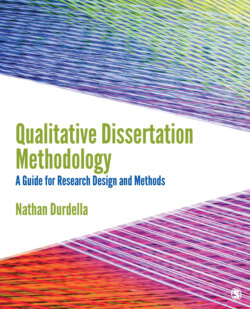Читать книгу Qualitative Dissertation Methodology - Nathan Durdella - Страница 72
На сайте Литреса книга снята с продажи.
Connecting qualitative methodology to coursework.
ОглавлениеOne of the strongest mechanisms to negotiate dissertation methodology is program coursework. In fact, curricular offerings represent the most important and generally most efficient approach to not just develop the components of a methodological framework but complete the background work necessary to justify design and methods associated with a study. Generally speaking, the structure, sequence, and content related to courses in doctoral programs offer a range of options to students to navigate through the early development of a dissertation research framework and methodology. Indeed, standard courses tend to include theory, content, methods, and application or field-based courses—completed over a 2-to-3 year period. Looking at these courses through a dissertation methodological lens, they can be seen as follows:
Yearlong pro-seminars and semester content courses in subfields or areas of study may support developing an understanding of major figures in the empirical and conceptual literature and facilitate initial and even more advanced development of a research problem, purpose, and questions.
Methods courses cannot only build the knowledge base and skill set to design and execute an entire dissertation study but also allow students to develop the essential components of a methodological framework—from the assumptions and foundational concepts of research design to specific procedures for data collection and analysis. Frequently, these courses force students to get into the field and pilot instruments and experiment with procedures—all of which advance conceptually and sometimes pragmatically elements of dissertation methodology.
Field-based or research apprenticeship courses may offer students opportunities to consult folks at potential data collection sites and in research settings similar to those that will form the locations where they will perform data collection. These experiences may allow students to build rapport with gatekeepers, flesh out research questions, pilot data collection instruments—interview protocols or descriptive observation guides, for example—or get to know the lay of the land at data collection sites.
Whether at the start of a program or near the end of curricular degree requirements, reading and written assignments, lectures and activities, and instructor and peer discussions can move students toward a firmer understanding of what they want to do in their studies in terms of design and methods and support actual work in the development of their dissertation methodology chapters. In fact, you can negotiate or situate dissertation-related work in almost all of these elements of program coursework. In a position in which students grasp what they will do or have an early or working draft of their dissertation methodology drafted, students tend to consult their dissertation chairs with a stronger position, which may potentially mitigate the effects of recommendations—or strong suggestions—related to methodology from their chair.
